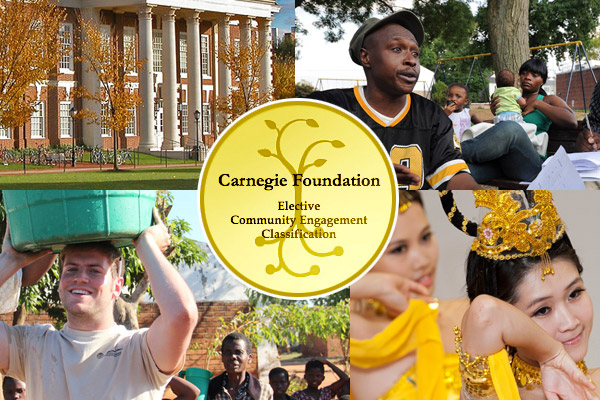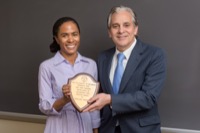
Engaged UD
University of Delaware receives Carnegie Community Engagement Classification
9 a.m., Jan. 7, 2015--Led by University of Delaware professor Yasser Payne, 15 residents of the Eastside and Southbridge neighborhoods of Wilmington, Delaware, receive training as research assistants to help determine the underlying causes of violence affecting their communities.
Through the nationally recognized Lori’s Hands, founded by Sarah LaFave when she was a UD student, college students provide in-home support to people with chronic illnesses such as cancer and multiple sclerosis.
Honors Stories
National Medal of Science
Warren Award
Thanks to the bridge over the Rio Vibora built by UD’s student chapter of Engineers Without Borders, residents of the community of San Jose Petacalapa in Guatemala can now easily reach their farmland even during the rainy season.
These are just a few of the many efforts for which the University of Delaware has received the Community Engagement classification from the Carnegie Foundation for the Advancement of Teaching.
In order to be selected for the nationally recognized classification, institutions had to provide descriptions and examples of institutionalized practices of community engagement that showed alignment among mission, culture, leadership, resources and practices.
“The University of Delaware is delighted that the Carnegie Foundation has recognized our deep commitment to working with community partners to address societal issues and contribute to the public good,” said Patrick T. Harker, UD president. “Community-based experiences are woven into UD’s teaching, research and service activities—they are critical to the education of our students as civic-minded, engaged citizens.”
Founded by Andrew Carnegie in 1905 and chartered in 1906 by an Act of Congress, the Carnegie Foundation defines community engagement as “the collaboration between institutions of higher education and their larger communities (local, regional/state, national, global) for the mutually beneficial exchange of knowledge and resources in a context of partnership and reciprocity.”
More than 300 unique community partners and over 375 examples of community projects were identified during the development of the University’s application for the elective classification, which was submitted to the Carnegie Foundation in April 2014.
Under the leadership of Lynnette Young Overby, professor of theatre, a task force encompassing faculty, staff, student and community representatives researched and assembled the successful application, which included major sections focusing on foundational indicators, curricular engagement, and outreach and partnerships.
“Our findings underscored that UD is a dynamic force for good, involved in meaningful work in communities near and far,” Overby said. “UD is robustly engaged with communities at the local, regional, national and global levels in efforts that benefit our students, faculty and staff, and the communities with whom we partner.”
UD is one of 240 U.S. colleges and universities to receive the 2015 designation. Of this number, 83 institutions, including UD, are first-time recipients, and 157 are now reclassified, after being classified originally in 2006 or 2008. These 240 institutions join the 121 institutions that earned the classification during the 2010 selection process.
According to the Carnegie Foundation, UD’s community engagement classification is valid until 2025. The reclassification process will begin in 2023 when the University will be asked to provide evidence of how community engagement has become deeper, more pervasive, better integrated and sustained on the campus.
UD’s Community Engagement Task Force evolved into the Community Engagement Commission last summer. The commission has been studying models and best practices at other institutions to recommend a structure best suited for sustaining and expanding UD’s community-based efforts. The commission is expected to provide a report of its findings and recommendations to Nancy Brickhouse, deputy provost for academic affairs, this winter.
President’s Community Service Honor Roll
UD also recently was named to the President’s Higher Education Community Service Honor Roll, which recognizes “higher education institutions that reflect the values of exemplary community service and achieve meaningful outcomes in their communities.” UD was recognized in two areas: General Community Service and Education. It is the seventh year that UD has been named to the honor roll.
The honor roll is part of the Corporation for National and Community Service’s strategic commitment to engage millions of college students in service and celebrate the critical role of higher education in strengthening communities.
As just one example, the University of Delaware has drawn on a long-term partnership with the Delaware Coalition Against Domestic Violence to collaboratively develop the Domestic Violence Prevention and Services Program (DVPS), which is the only program of its kind available to undergraduates in the United States.
Housed in UD’s Department of Women and Gender Studies, the program’s course content and curriculum are developed in coordination with the Delaware Coalition Against Domestic Violence’s training criteria for becoming a certified Domestic Violence Specialist in the state of Delaware. Core faculty in the program regularly meet with the Delaware Coalition Against Domestic Violence and revise the content of their current syllabus to reflect the best practices for advocates and their organizations, the needs of survivors and the most current academic research.
The program benefits the community by providing more than 3,200 hours of direct service per year from trained students to survivors and agencies across Delaware. Participating students gain valuable experience in their first steps toward careers in domestic violence advocacy.
“The University of Delaware places a high value on community service, as these latest national honors attest,” said Nancy Brickhouse, deputy provost for academic affairs. “By giving our students great opportunities to put their academic training to work, we can help propel them on a lifelong path of civic engagement.”
For more information, visit the UD Engage website.








